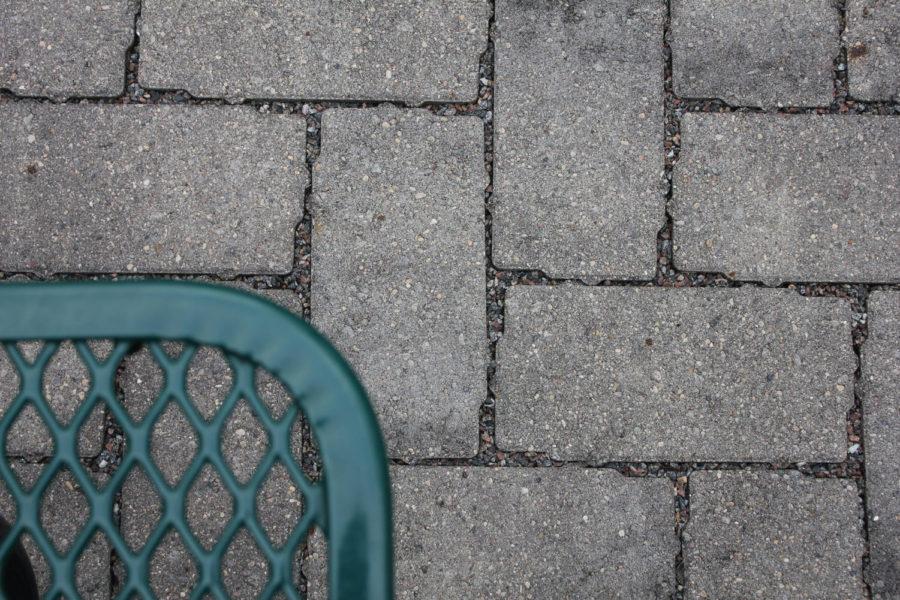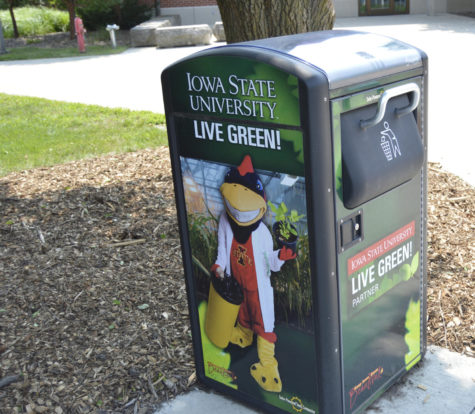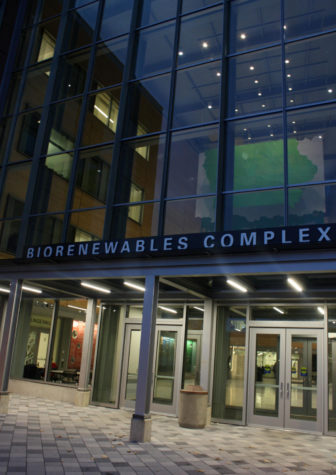Permeable pavers answer building’s prayers to puddles
Jonathan North/Iowa State Daily
Brick pavers outside the College of Design are an environmentally friendly alternative to concrete or asphalt. The bricks can absorb up to five gallons of water, keeping it out of the sewers. This design prevents puddles and ensures the water returns to the ground.
October 30, 2014
Buildings at Iowa State University are using effective new ways to reduce the runoff of excess rainwater. Sukup, Elings and the Biorenewables Building are using permeable pavers to help rainwater soak into the ground.
“The biggest reason we are using them [permeable pavers] is that the west side of campus has some severe restrictions in storm water management,” said Kerry Dixon, coordinator of sustainable design with Facilities Planning and Management.
When Sukup, Elings and the Biorenewables Building were built, off-flow of rainwater in the new and renovated buildings was required to be less than it was before construction, Dixon said. The new pavers were installed to help meet that goal.
Permeable pavers control the flow of rainwater into the ground, said Mike Kunard, territory manager of AZEK Building Products, a company that manufactures permeable pavers. The average landscape can handle a flow rate of about 1 gallon of water per square foot per minute, Kunard said, but permeable pavers can handle 5 gallons of water per square foot per minute.
“I love it,” Dixon said. “I was given a tour over at ABE [Sukup, Elings and the Biorenewables building] a couple weeks ago. It was absolutely pouring all morning. We get over there, it stopped raining, and [on] all of the sidewalks coming up were various puddles that everyone’s trying to avoid, and you hit that plaza and it’s dry.”
Driveways, patios, walkways and low slope rooftops are just a few of the places permeable pavers can be used, Kunard said.
“We were looking for something that was lightweight and easy to handle, this [permeable pavers] kind of fit the bill,” said Gordon Woods, manager of heating plant maintenance.
Recyclability is one of the best features of the new pavers, Kunard said. For every 1,000 square feet of pavers made, 500 tires and 1,500 one gallon plastic containers are removed from landfills. The pavers themselves can be recycled and made into new pavers.
“That’s a benefit, that they do have recycled content in them,” Dixon said. “We’re trying to specify and use more products that have a higher recycled content. It’s just less product that’s winding up in a landfill somewhere.”
The average price of AZEK pavers are about $8-$10 per square foot while the price of standard concrete is $5-$6 per square foot, Kunard Said. But Dixon said the increase in price shouldn’t prevent someone from using permeable pavers.
“That is a first time cost, the long term cost for us not retaining the water on site is much higher,” Dixon said. “The use of permeable pavers pays for themselves very quickly,” Dixon said.
Kunard sees the popularity of permeable pavers growing. He said people are becoming more environmentally conscious and they want to be more responsible for rainwater runoff.









